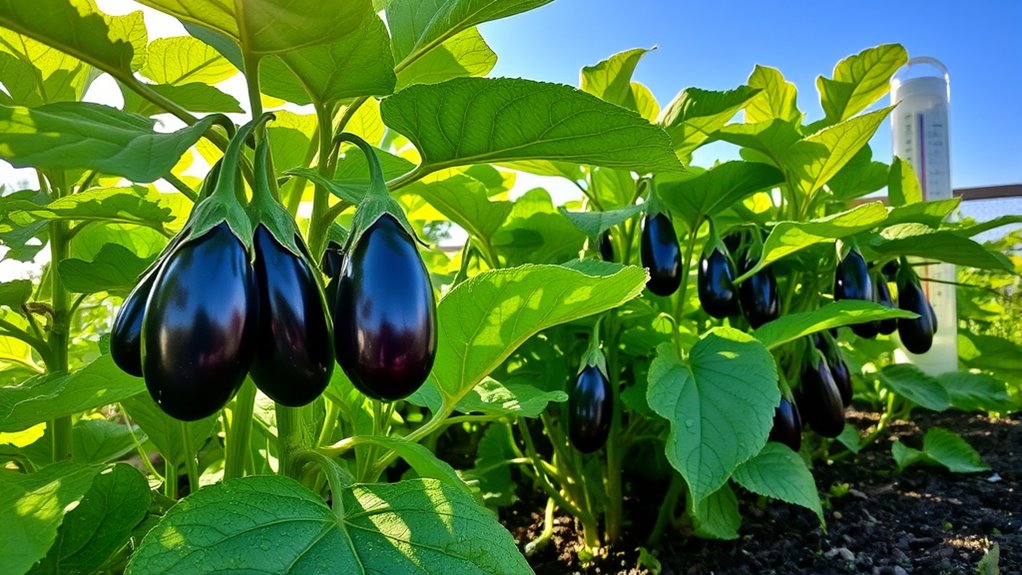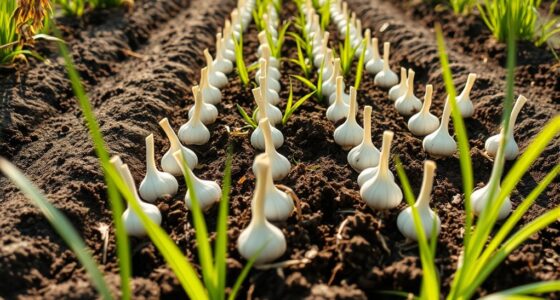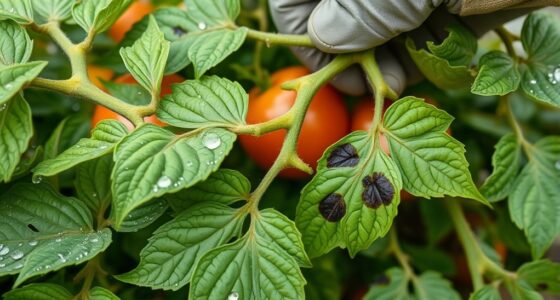Eggplants thrive in warm temperatures, with ideal germination occurring between 70°F and 95°F, peaking at 86°F. For optimal growth, ensure soil temperatures are at least 70°F and maintain a pH of 6.3 to 6.8. Plant after the last frost, spacing them 18 to 24 inches apart, and provide consistent watering of one to two inches per week. By understanding these conditions, you'll set your eggplants up for success, and there's more to discover about effective gardening practices.
Key Takeaways
- Eggplant seeds germinate best in temperatures between 60°F and 95°F, with peak germination occurring at 86°F.
- Ensure soil temperatures exceed 70°F for optimal growth and development of eggplant plants.
- Start seeds indoors 8 to 10 weeks before the last frost, and transplant when soil temperatures are above 50°F.
- Maintain a consistent watering schedule of one to two inches per week to prevent water stress during critical growth periods.
- Provide full sun exposure, ensuring plants receive at least six hours of direct sunlight daily for optimal growth.
Ideal Germination Temperatures
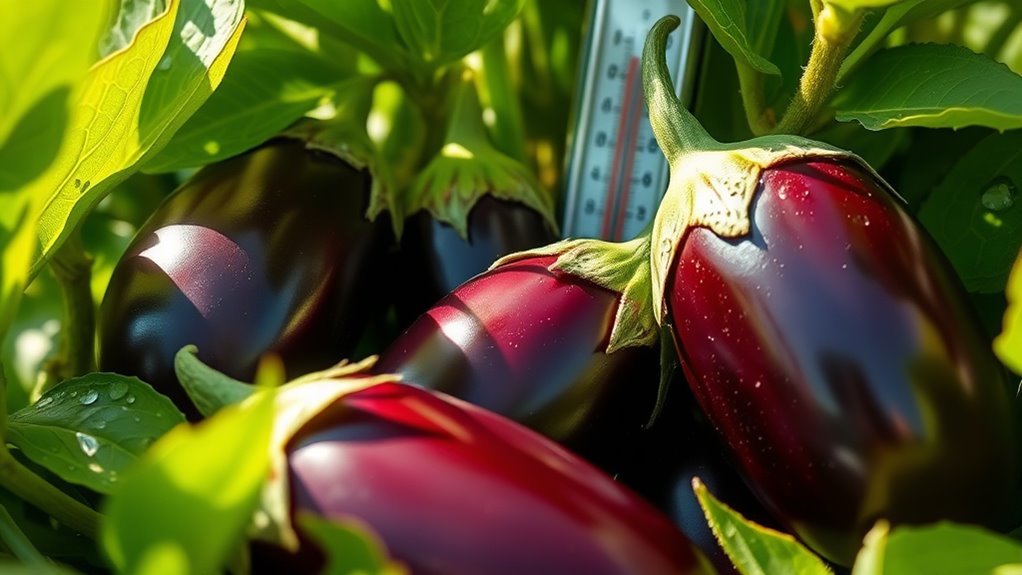
When starting your eggplant seeds, understanding ideal germination temperatures is key to successful growth. Eggplant seeds germinate best between 60°F and 95°F, with the optimum range being 70°F to 95°F, peaking at 86°F.
At these temperatures, you can expect seeds to germinate within 10 to 15 days. To achieve these conditions, warm your soil before sowing, ensuring it's primed for germination.
If you're starting seeds indoors, do so 8 to 10 weeks before you plan to transplant. Sow seeds ¼ to ½ inch deep in a light potting mix, and provide adequate light to encourage healthy growth.
Optimal Growth Conditions
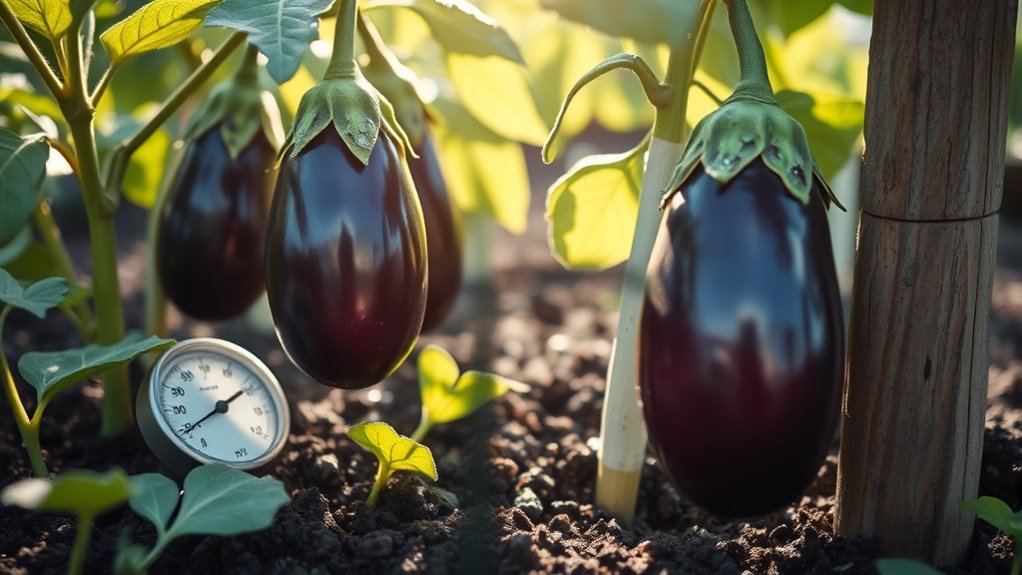
To achieve optimal growth for your eggplants, it's crucial to create the right conditions that cater to their specific needs.
Start with well-drained, fertile soil, ideally with a pH between 5.5 and 7.0. Incorporate compost to enhance nutrient levels and balance pH. Ensure the soil temperature is at least 70°F, as eggplants thrive in warm conditions.
They need full sun, so position them where they'll receive at least six hours of direct sunlight daily. Water consistently, aiming for one to two inches each week, and consider using drip irrigation to maintain moisture.
Finally, protect your plants from frost with floating row covers, especially during chilly nights, to ensure healthy growth and fruit production.
Planting and Spacing Guidelines

Proper planting and spacing are essential for maximizing your eggplant yield. Wait until all danger of frost has passed and soil temperatures rise above 50°F (10°C). Ideally, germinate seeds at temperatures over 75°F (24°C).
When planting, set transplants at the same depth as their containers. Space your plants 18 to 24 inches (46-61 cm) apart in rows, with rows spaced 30 to 36 inches (76-91 cm) apart. If you're using containers, maintain the same spacing.
For best results, enrich your soil with compost and ensure a pH of 6.3 to 6.8. Consider companion planting to enhance growth and deter pests, but give each plant enough space to thrive without overcrowding.
Watering and Fertilization Practices
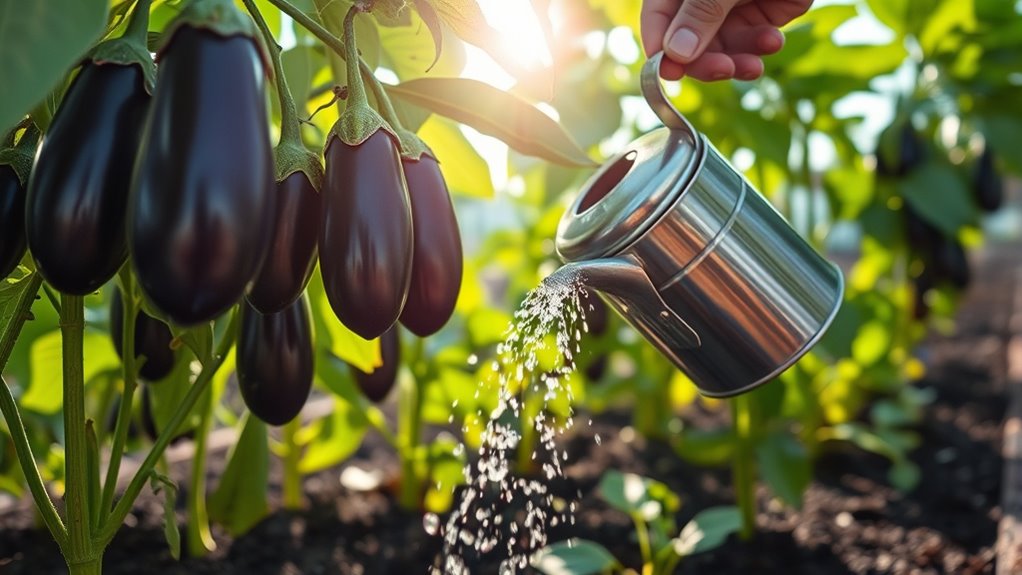
Since eggplants thrive on consistent moisture and proper nutrition, understanding your watering and fertilization practices is crucial for a successful harvest.
Water deeply and infrequently, especially during the first month after transplanting, to prevent root rot. Drip irrigation is ideal, as it maintains soil moisture without waterlogging. Avoid water stress during the bloom period to ensure good fruit set.
For fertilization, enhance your soil with organic amendments like compost or manure. Side-dress with nitrogen fertilizers when plants are half-grown, applying 0.5 to 1 pound per 100 feet of row.
Be careful not to overfertilize, as this can lead to excessive leaf growth and delayed flowering, impacting your yield. Regular soil testing can help tailor your nutrient needs. Additionally, ensuring proper water management practices can prevent issues such as root rot and support overall plant health.
Pest and Disease Management Strategies
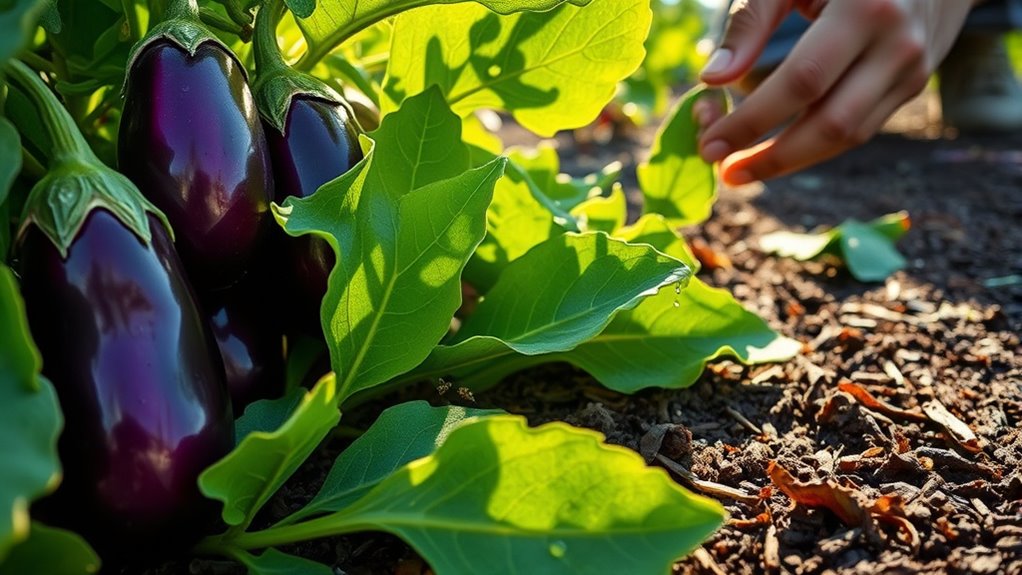
While growing eggplants can be rewarding, managing pests and diseases is crucial for a successful harvest. Start by implementing Integrated Pest Management (IPM) strategies.
Use cultural controls like proper plant spacing and crop rotation to limit pest habitats. Encourage beneficial insects, such as ladybugs and lacewings, for biological control. Mechanical methods, like physical barriers, can deter pests effectively. If needed, apply organic pesticides as a last resort.
Regularly inspect your plants for early signs of pests like flea beetles and whiteflies. For diseases, practice crop rotation, maintain soil health, and use drip irrigation to minimize foliar issues.
Removing infected plants and applying fungicides like copper can also help protect your eggplants.
Frequently Asked Questions
How Do I Know When to Plant Eggplants Outdoors?
To know when to plant eggplants outdoors, wait until nighttime temperatures consistently exceed 50°F.
You should ensure the soil temperature reaches at least 70°F for optimal growth.
It's best to start your seedlings indoors 8 to 12 weeks before the last frost, then gradually harden them off over a week or so.
Once conditions are right, you can transplant them into well-prepared soil for a thriving eggplant harvest.
Can Eggplants Survive Sudden Temperature Drops?
Imagine your eggplants as delicate dancers, swaying gracefully in the warmth of summer.
Unfortunately, sudden temperature drops can throw them off balance. They struggle to survive when the mercury dips unexpectedly, risking flower drop and fruit set. If you don't protect them, they may not recover quickly.
To keep your garden's performers thriving, use row covers or cloches—think of them as cozy blankets against the chill. Your eggplants will thank you!
What Are the Signs of Frost Damage on Eggplants?
When you notice frost damage on your eggplants, look for specific signs.
Leaves will appear water-soaked and soft, eventually turning black. The fruit's surface might develop a bronzed appearance, while the seeds and pulp inside turn brown.
Initially, leaves show injury right away, but it may take 5 to 7 days for the fruit to display symptoms.
Keep an eye out for these signs to protect your plants from further damage.
How Long Does It Take for Eggplants to Mature?
Eggplants typically take about 100 to 120 days from seed to harvest.
If you transplant them, you'll see maturity in around 65 to 80 days.
You'll want to start seeds indoors about 8 to 9 weeks before the last frost.
After germination, expect the first shoots in about a week.
Keep an eye on the weather and provide the right conditions to ensure they grow efficiently and reach maturity in time.
Can I Grow Eggplants in Containers?
Growing eggplants in containers is like nurturing a small garden of potential. You can absolutely grow them this way!
Just use at least a five-gallon pot with good drainage, and choose a dark-colored material to soak up the sun.
Make sure your soil is rich and well-draining, and don't forget to water regularly.
With the right care, your container-grown eggplants can flourish and reward you with a bountiful harvest.
Conclusion
In conclusion, knowing eggplant's temperature tolerance can really boost your gardening success. Did you know that eggplants thrive best when daytime temperatures are between 70°F and 85°F? By keeping this in mind and following the tips on germination, planting, watering, and pest management, you'll set yourself up for a bountiful harvest. So get out there and enjoy the process, because with the right care, your eggplants will flourish like never before!

